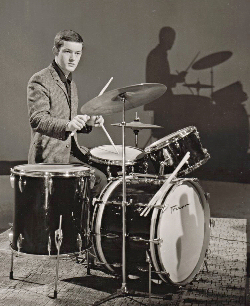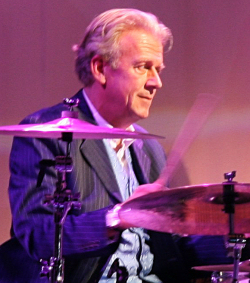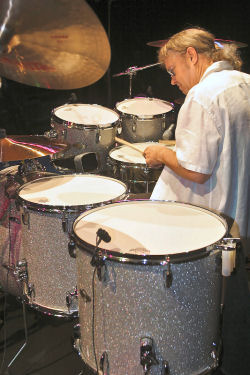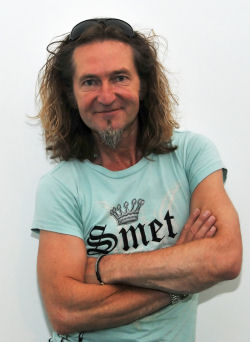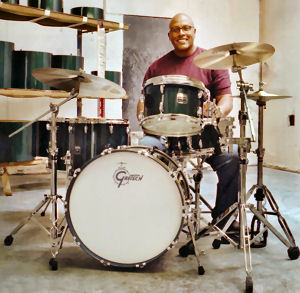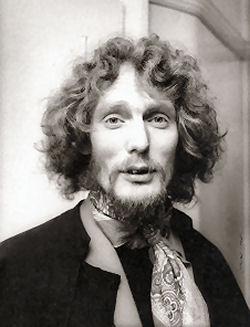
Classic, dapper Ginger Baker
Ginger Baker was recently honoured with the ‘Zildjian Drummers Achievement Award’ at a special gig at Shepherds Bush Empire on December the 7th 2008 and I went along to talk to him at a press launch a few weeks before the event. I figured all the other magazines would be asking him about Cream, Eric Clapton and Jack Bruce so wanted to come up with a different angle.
What got you into drumming all those years ago?
I think I was born a drummer, when I was a kid I was always banging on the table. Listening to music, I would try and focus on the drummer. As I got older we started going to jazz clubs and I would only listen to the drummer, in those days it was sort of trad music, it was a happening thing. But I was also listening to Big Bands, like Jack Parnell, Phil Seamen and all those guys. When I was at school I used to bang on the desk and all the kids used to dance around.
I was intent on becoming a cyclist, I was a cyclist. I was training all the time; I was Club Junior Champion in 1955 and my ambition was to ride in the Tour De France. I had a job in town, and we used to do these cycle races at Brands Hatch, every Thursday. It was Thursday 13th August, it was lap 13 and I was number 13, it was a prime lap, and I worked out a plan to win the lap. I was coming right from the back, coming right through everybody and I got entangled right at the front of the bunch with the handle bars of a guy called Ginger Booker from the Woolwich Club and I went down and brought half the bunch down with me. I turned up for work the next day with my arm in a sling; I’ve still got the burn marks on my shoulder where I went along the ground. Anyway, when I got to work the art director said I had to either give up the cycling or give up the job (this is the British way of encouraging sport), so I told him to stuff the job up his arse.
What was the job?
It was a lettering firm in Central London. So I got another job at the Robert Freeman company, I was training to be a graphic designer, and I used to ride to work everyday, training because it was 14 miles from where I trained up to central London and I could do it a lot quicker than cars. It was right at the end of the season, about September/October, and I was riding home on Duke Street, St James at that time was cobbles and wooden blocks. It was raining and my cape became entangled with a taxi door handle. So I was tied on to the side of the taxi and I managed to get myself away from it but as I did that my bike went underneath and the taxi just drove straight over the bike, both wheels, the frame, the whole lot, and destroyed it completely – and I still hadn’t finished paying for it.
So that evening there was a party, one of the few school friends I had was having a party at his house, and I was invited to it and they had a band there. They were all telling me to go and sit in on the drums, I’d never sat behind a kit before, but they all knew I was a drummer. I was just watching drummers everywhere I went, I wasn’t really keen on doing it but they got me to sit in and I got behind the kit and I could play. It was just natural, I was playing cymbal, hi-hat, bass drum, snare drum, it all just came together and there were two horn players, one of them was playing a solo, standing in front of me and one turned to the other and said “Jesus Christ we’ve got a drummer” and a sort of light went on and I realised ‘Bloody hell, I’m a drummer’. I could play immediately.
I got home and told my mum I wanted to get a drum kit and she said: ‘You still haven’t finished paying for the bike’. There was a drum kit going, just a bass drum, snare drum and hi-hat and cymbal for £12, there was no way I had £12 and my mum wouldn’t lend me the money, but I was determined. I found a toy kit for £3 which I could just about scrape together and I cut up my tent to put a front head on the bass drum which I painted this strange design on and the snare drum had just tighteners on the top only and one little tom tom but I found a biscuit tin was the same size and I fixed the biscuit tin on it to make it a bit deeper and that was my first kit.
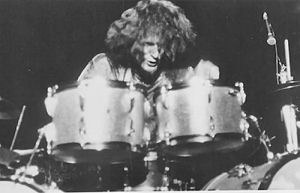 I got a little band together with my cousin playing banjo (playing it rhythmically because he didn’t know what a chord was) and a couple of other friends of mine. The guy whose party it was played trombone, a kid called Dave Tomlin played clarinet. We did one gig at Bungy’s Coffee Bar, around the corner from Robert McFreeman and earned the princely sum of £4/11 shillings.
I got a little band together with my cousin playing banjo (playing it rhythmically because he didn’t know what a chord was) and a couple of other friends of mine. The guy whose party it was played trombone, a kid called Dave Tomlin played clarinet. We did one gig at Bungy’s Coffee Bar, around the corner from Robert McFreeman and earned the princely sum of £4/11 shillings.
What year was that?
1956. So I was reading Melody Maker and there was an advert for a drummer, and I took this toy kit with me all the way to Stratford (I lived in New Eltham) and told them my kit was being repaired and to my total amazement I got the job, just like that. Then I went home and told my mum I had got a job in a band and I said that I had to have a drum kit and she lent me the money to put a deposit on one. I went to Vic O’Brien and got a blue bass drum, white snare drum, different colour tom tom, on hire purchase with this £50 deposit, a hi-hat and cymbal and that was the Storyville Jazz Band. The following week Bob Wallis joined the band.
So was that the Bob Wallis Band eventually?
It was called Bob Wallis and The Storyville Jazz Band, the guy who actually ran it was the banjo player, Hugh Rainey. That was my first gig and the clarinet player gave me a whole set of 78’s of Baby Dodds ‘Hear Me Talking To You’, which had an amazing effect. Musically I was listening to my favourite record it was the Quintet of the Year, with Dizzy Gillespie, Bird, Bud Powell, Charlie Mingus and the God of all drummers, Max Roach. I actually stole the record and got initiated into the school gang because I’d actually joined them in nicking things.
Listening to Phil Seamen with the big bands and in the jazz clubs, like Lenny Hastings, Dave Pearson, anyway, he gave me these records and it was a revelation. Baby Dodds just blew me away, I could see where Max had come from. Some of the things I picked up, such as the best thing is to make the horns sound good, which is what a drummer’s job is. The old saying ‘a band’s only as good as its drummer’ is extremely true. It’s very sad that the drummers are always the ones that get ripped off. They do, drummers are very often, very musical, but bands come across as 5 musicians and a drummer. It’s a great problem to overcome. They take your ideas and think ‘no, that was my idea’ and don’t accept that it came from a lowly drummer.
What came after Bob Wallis – was that Acker Bilk?
Through Bob we met Acker Bilk, so I made my first record in 1957 for Doug Dobell with the Storyville Band and I also did a record with Acker. I knew Acker very well, in fact I did a gig with him Christmas 1957 – it was the first time I made love with my first wife! It was in Bristol, his drummer was in Denmark for Christmas and I went and did a BBC TV gig with Acker’s band, it was quite extraordinary. I took my then girlfriend with me, we booked into a hotel as Mr and Mrs, and very nearly missed the gig. I ran into the front entrance and I had one of these flick knives in my pocket and I ran down the thing and jumped on to the stage and as I jumped onto the stage the flick knife opened and stabbed me in the leg. I got on stage and there was blood on my trousers. That was the Acker Bilk gig.
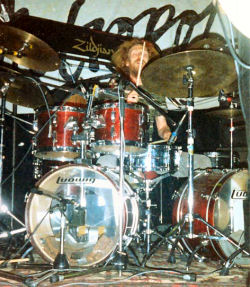 In those days musicians used to gather in Archer Street to get gigs. Where you part of that?
In those days musicians used to gather in Archer Street to get gigs. Where you part of that?
Yes, but this is later. Anyway, after The Storyville Band, I got the offer of The Terry Lightfoot gig which was one of the top trad bands at the time – you got a band uniform and £16 a week – every week. This was amazing, the big time. I think I did a record with them, we did ‘Winter Wonderland’ or something but my technique was coming together and I’d got into listening to other things like Big Sid Catlett. So we’d be playing and I would go ‘bomp’ on the bass drum and ‘whoa’ – Terry Lightfoot would nearly swallow his clarinet, he wanted 4/4 continuing throughout and I kept putting these [bomb] things in. And it was at a gig in town somewhere with all the wives there and I let one of these things go and he turned around to me on stage and said ‘You don’t come and practice with my band’ and I said ‘Stuff your band up your arse’ and that was the end of Terry Lightfoot.
The story goes on and on, my daughter’s writing my book, which John Blake is publishing.
That was just what I wanted, to know where you came from. When did you get your first American drum kit?
When I joined Terry Lightfoot I got a complete Vic O’Brien drum kit, it was a white one. Then further on in my career I came up with this wonderful scheme of Perspex shells. I was living in this musicians’ house in Grosvenor Avenue, Highbury near the Arsenal football ground and I went down to the town and found this Perspex shop. I got this dark green Perspex and I had an 11″ [deep] bass drum and we had a little gas ring we cooked on and I bevelled the two edges and bent the Perspex round and bolted it through and then put the hoops from the Vic O’Brien drum round this thing, to dry it and make a circle and I made two tom toms and a bass drum out of green Perspex. It was a great sounding kit! I had a 7″ deep shell on the small tom tom and a 12″ shell on the big tom tom and an 11″ shell on the bass drum and I used that kit right throughout the Graeme Bond Band right up until Cream.
Phil Seamen and I once went into Drum City, Shaftesbury Avenue and this white haired old guy was sitting on a chair in his underpants sewing up this little ‘L-shaped’ cut in his trousers, and this was Bill Ludwig ‘One’. Phil and I used to go in and play on a couple of kits and we played there and old Bill Ludwig was totally blown away with what he’d heard. He was really very nice, and I decided if ever I got a kit it would be a Ludwig kit because he was such a nice old bloke. When Cream started getting very popular, they offered me a kit and that’s when I wanted the two bass drum kit after going to the Ellington Concert with Sam Woodyardin Georgia, and they offered to make me a kit for nothing which was amazing. I went to Boston [to see Zildjian] in the States on our first trip doing the Murray the K show and I’ve still got the hi-hat and ride cymbal that I picked up.
I’m going off track now but was ‘Disraeli Gears’ your title?
No Mick Turner’s. Just after we’d made the record, Eric wanted to get a racing bike, and because I’d been a cyclist he was talking to me in the back of the car about the bike, and Mick was driving and he said ‘do you mean one of the them bikes with Disraeli gears’ and we all just collapsed on the floor, it was so funny, and we decided that was the album title. He actually gave Mick a gold disc too.
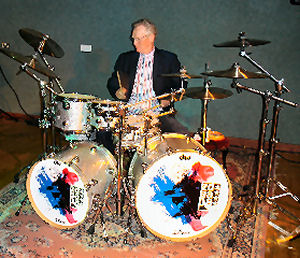 Have you still got a bike?
Have you still got a bike?
No, I’m 69 years old, I use horses.
What got you into horses?
Nigeria. This is an incredibly long story.
I’ve got time if you have?
Well, I moved to Nigeria in 1971 and built a recording studio there. I took the first Range Rover into Africa in ‘71 to partake in a Rally and I was approached by two guys who also had Range Rovers because they said they really wanted me to finish. This was against professional rally drivers and I came second on the special stage.
They then got me into the Argungu Rally, it only ever ran once because lots of animals got killed, one village got destroyed, it was craziness. The first stage, I got a Range Rover which they gave it to me super cheap because of the success we had had and all the Range Rover sales they were getting all over Africa by this time. They brought a book out a few years ago ‘Thirty Years at the Top for the Range Rover’ and I’m one of the drivers in it.
Anyway, to cut a long story short, because of a dodgy pump we had stopped, but once I had got it working I jumped in and said to the navigator ‘Right toe-down, foot to the floor all the way to the finish’. I got the nickname of Sideways, the only one who could make a Range Rover dance without turning it over. I got to the stage finish and instead of driving through and my navigator handing the papers over, I came through and did a 180 to save as much time as possible, in a big cloud of dust. We handed the papers into the office and out of this huge cloud of dust this voice came out and said ‘Bloody hell, the way you drive you should play polo’ and I said ‘You’ve got to be ****ing kidding’.
So I got to know this guy, Colin Edwards, who had an extraordinary history. His father was a builder who was in Nigeria doing some building for the Emir one of the richest men in the world and a big polo playing family and I got very friendly with him.
The Emir was a really good polo player, he was a 6 goal player which was quite a high rating, so we became friends. I had to fly back to Lagos because I had the only right-hand drive Range Rover in Nigeria because in 1972 they decided to change from driving on the left to the right which was a horrendous time – people going both ways on both sides of the freeway, it was amazing.
Well when I got back at about 4 a.m., my flat was on top of the studio, and the locks had been changed. I couldn’t get in. But I’d built the place so I climbed up on the air conditioning, got to the kitchen window and climbed in. I was on the top floor of a two-storey building in the middle of the bush and saw there were two lots of blue lights coming. I jumped over the balcony and into the car. There was only one track to the studio which obviously the police were using and there was this huge high grass [alongside] about 7 foot high and I just went through the grass with my foot down. I could hear all these ricochets; it was like a western film. I zoomed down to Colin’s house. I told him what had happened and he got on the phone and off we went. Where did we go? Lagos Polo Club, where we met one of Colin’s best friends, a guy called Omuru Shincaffey a really tall, Nigerian guy who was a polo player but was also the Assistant Commissioner of the Special Branch Nigerian Police. So we told him what had happened and he got on the phone and the police all got into big trouble.
However, this was all caused by EMI Records. EMI Records had decided to destroy my studio because it was on their territory and they didn’t want it there and they had succeeded in getting my partner and me at each others throats. Anyway, the police were called off but meanwhile my partner’s got control of the studio and my flat so I was eating out of Colin’s place but I went to the Polo Club regularly with Colin. It was on my third visit, we had all been drinking, and I’d had about 10 large Bacardi and Cokes and Colin came out and said: ‘Right, Baker, it’s time you got on a horse’. Apparently there were bets from around the whole club because everybody knew I’d never been on a horse before. Colin, because of my driving, was convinced I would stay with it. So we went up to the stables and there’s this beautiful Argy mare with a big shiny backside and there were two grooms standing either side holding the bridle, and I got on and Colin adjusted the stirrups and put the reins in my hand. The two grooms let go of the horse and Colin got a whip and went ‘whack’ across the backside of this horse and it took off.

Ginger Baker in 2005
I was flying around the track and obviously the horse was used to going around this track exercising so knew where it was going, but it was flying flat out. The horse went all the way round the track and when it got back home to the stables it stopped and I was still on it. Colin won a lot of money on that I think. He said: “Right Baker, report for duty at 8 a.m. in the morning”. So at 8 o’clock there was a big sand ring, a schooling area, I was on the same horse as before and Colin was on another horse and he showed me how to stop, left turn, right turn and we did this for 10 days and on the 10th day he said “You’re doing great, you’re down for 4 chukkas this afternoon”, and he produced a pair of old boots and stuck a polo stick and an old hat on and I was on the field playing polo and it’s quite amazing because the first time I came up to a ball I whacked it and that was it. So that’s how I got into polo.
That’s fantastic. I’ve never read that before. I knew about you going to Nigeria though. Did EMI own that studio initially?
No, I built a studio there. There was a guy called Mike Wells who was the managing director of EMI in Lagos who had been there 12 years after 2 years in the Army. He loved it in Lagos and when he heard what I was doing [with the studio] he was incredibly supportive. He said he’d been telling EMI to do it for years and they hadn’t taken any notice. We became good friends and he was really helpful, because Lagos is all rush, rush, rush and he said he would show me the quiet side.
I had my girlfriend with me and he had this little boat and we went out fishing with a crate of beer. We were out in Lagos Harbour when we saw a Light Ship, and there were people on the ship waving and we were going ‘Hello!’ and further up the harbour there was another boat with a big diving flag on and we were half way between the Light Ship and this other boat when the sea erupted into a fountain! We were about 100 yards away and this blast came across and there was this big red-faced bloke standing on the boat with the diving flag screaming and shouting. This was after the war and a lot of ships had got sunk in the harbour which was a danger to shipping and they were blowing them up. The people in the Light Ship were trying to tell us not to go there. It was quite an experience; the divers had attached all their explosive stuff and got back to the ship. So they pressed a button and then saw us.
Talk about Ginger Baker living dangerously…
Mike Wells went off on leave and never returned, they sent him to Argentina because of his friendship with me and this other guy took over and that’s when things started going wrong. The Managing Director of EMI told me to my face ‘we’re gonna screw you’ and they set about doing just that, they had over 90% of the musicians in West Africa under contract and wouldn’t let them use my studio, they wouldn’t press our records, they had a place there called Record Manufacturers Nigeria Ltd which was jointly owned by EMI and Decca a record manufacturing plant but they wouldn’t press our records. We had to send our tapes to Chris Blackwell at Island Records in England to get the records pressed and re-ship them back and there went all the profit. No profit. They killed me, EMI killed me stone dead!
Interview Bob Henrit


